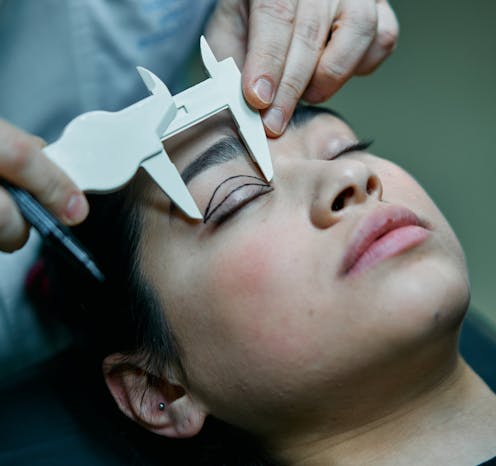
If you're thinking about a tummy tuck, breast implants or eyelid surgery, you might be looking for reassurance your chosen doctor is qualified and has the right skills for the job.
Authors
Christopher Rudge
Law lecturer, University of Sydney
Cameron Stewart
Professor at Sydney Law School, University of Sydney
Today's release of the much anticipated review of how cosmetic surgery is regulated in Australia goes partway to achieving that.
The review makes several sensible suggestions about how to protect consumers, following allegations around cosmetic surgery practices aired in the media (which prompted the review in the first place).
There's much to commend. The review is comprehensive, sober, realistic and the product of considerable consultation.
It recommends tightening up how cosmetic surgery is advertised, streamlining how to complain when things go wrong, and improving how complaints are managed.
However, these recommendations and others, which the health professionals' regulator accepts, are unlikely to be implemented right away. Such reforms take time.
Recommendations to identify who has the appropriate education and skills to perform cosmetic surgery - a GP with or without extra surgical qualifications, a specialist plastic surgeon, or doctors with other titles - may take time to finalise and determine.
That's because plans to identify certain doctors as "endorsed" practitioners - effectively validating their ability to competently perform cosmetic surgery - hinge on the medical board identifying and approving what skills and education will be needed.
Any relevant course or training program would also need to be accepted by the Australian Medical Council (which looks after doctors' education, training and assessment).
Here's what needs to happen next to protect health consumers.
Remind me, what's the review about?
Over the past few years, the media has reported on allegations people had undergone inappropriate or unsafe cosmetic surgeries and were turning up to hospitals for remedial surgery.
Critics said people had been enticed by deceptive social media advertising and had trusted "inadequately trained" cosmetic surgeons to care for them. But they were never adequately warned of the risks.
Facing what threatened to become a crisis of regulatory confidence, the Australian Health Practitioner Regulation Agency or AHPRA (and its medical board) was bound to act. It commissioned an independent review of doctors who perform cosmetic surgery in Australia.
What did the review recommend?
The review examined "cosmetic surgeries" in which the skin is cut, such as breast implants and abdominoplasties (tummy tucks). It didn't cover injections (such as Botox or dermal fillers) or laser skin treatments.
It makes several significant recommendations.
1. Cosmetic surgeons need to be "endorsed"
A new system would see doctors "endorsed" as a cosmetic surgeon with AHPRA. This "blue tick" style of endorsement would only be given to those who had met a yet-to-be determined minimum educational standard.
Once rolled out, however, consumers would be educated to look for this endorsement on the publicly available register of health professionals.
2. Making complaints will be simpler
There are currently several avenues for making complaints about cosmetic surgeons, including to AHPRA itself, to the medical board (within AHPRA), as well as to state-based health-care complaints agencies.
The review recommends new educational materials be produced to show consumers exactly how and when to complain about cosmetic surgeons. It also recommends a special consumer hotline be created to provide further information.
2. Stricter rules on advertising
The review recommends tightening up existing advertising guidelines to strictly control those who promote cosmetic surgery health services, particularly advertising that might:
glamourise or trivialise risky procedures
use models who have not had cosmetic surgery to sell a cosmetic procedure
use social media influencers
suggest cosmetic surgery be used to obtain an "acceptable" or "ideal body type".
4. More scrutiny, more policing
Finally, the review recommends sharpening policies about how health professionals obtain informed consent for procedures, the importance of postoperative care, and the expected training and education of cosmetic surgeons.
The review also recommends AHPRA create a specific cosmetic surgery enforcement unit to regulate doctors providing these services.
Such an enforcement unit might refer problematic doctors to the medical board, which could then determine whether immediate disciplinary action was necessary. This might mean the immediate suspension of their registration ("medical licence").
Will these reforms work?
The Royal Australasian College of Surgeons and the Australasian Society of Aesthetic Plastic Surgeons have said the suggested reforms are inadequate and may even lead to some doctors being endorsed when they lack appropriate training.
Another possible reform rejected by the review was to make the title "surgeon" a protected title. This could then only be used by those who have done years of specialist training.
Indeed, Australian health ministers are currently examining this very issue.

Currently, any doctor can call themselves a "cosmetic surgeon". But since "plastic surgeon" is a protected title, only those with specialist training can use it.
Others doubt whether the enhanced regulation of titles will in fact improve safety. After all, a title is no guarantee of safety, and there may be unintended consequences too, such as the inadvertent creation of a market monopoly.
This has been a long time coming
Today's review is the latest in a long line of reviews of medical practice involving cosmetic procedures over the past 20 years. Until now, no reforms have been able to sustain long-lasting improvements in outcomes or reduce numbers of complaints.
These recurrent scandals and the regulatory stagnation reflects the fractured nature of Australia's cosmetic surgery industry - with its longstanding turf wars between plastic surgeons and cosmetic surgeons.
But this is also a multimillion-dollar industry that has historically been unable to agree on a set of standards for education and training.
In the end, for this review to catalyse meaningful reform, the next task will be for AHPRA to reach professional consensus about the standards to be set for cosmetic surgery. With some luck, the endorsement model may have the required impact.
It's a huge challenge, but an important one. After all, regulators who try to impose standards from above without the support of professional consensus face an incredibly difficult task.
![]()
Christopher Rudge was formerly a legal research associate at the Medical Council of New South Wales.
Cameron Stewart is a member of the Medical Council of New South Wales but the views expressed here are his own.






